
China
14:31, 20-Nov-2018
'Clash of civilizations isn't a future that awaits us'
Updated
14:14, 23-Nov-2018
By Abhishek G Bhaya
01:21
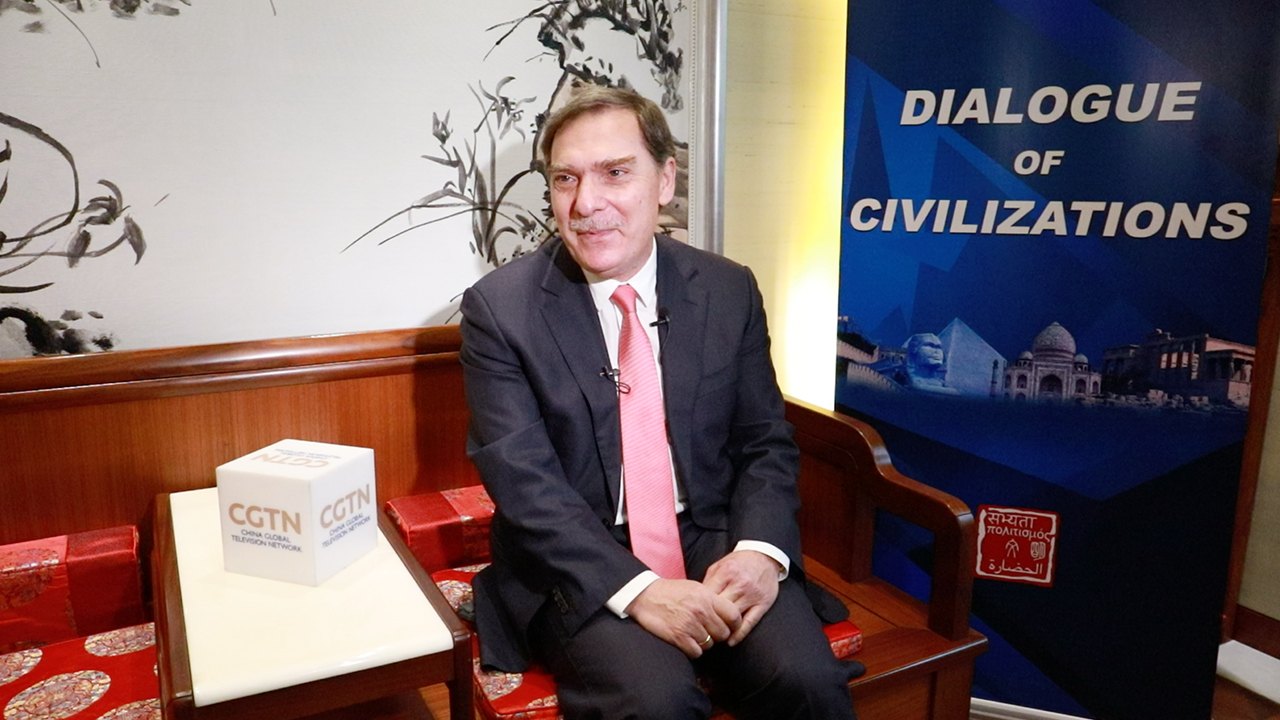
Top diplomats and officials from Greece, India, Egypt and China – four of the oldest civilizations with histories of thousands of years – joined their voices in dispelling the fears of a "Clash of Civilizations," while lauding CGTN's efforts in holding a "Dialogue of Civilizations," which they felt is the way forward in addressing the existing conflicts and disagreements between nations and civilizations.
Admitting that there are frictions "at different levels and of different intensities between civilizations," the Greek Ambassador to China Leonidas Rokanas, however, rejected the view that this would somehow necessitate a "clash of civilizations" as predicted by the famous hypothesis coined by American political scientist Samuel P Huntington in 1993.
"To ascertain [that] there is a sort of a historical necessity of a clash of civilizations is not the correct view… It is up to us entirely and our political leaderships and political wisdom [to determine] what is going to happen with this so-called 'clash of civilizations' and what is going to happen on all other big global issues," Rokanas told CGTN Digital in an exclusive interview.
"So it (clash of civilizations) is not some sort of destiny. It is not some sort of future that awaits us, it's not a historical law," added the envoy, emphasizing on the need to "bring back politics into international relations" instead of "relying mostly on economics."
"We thought that there is an economic machine that underpins all historic development. [While] this is not fundamentally wrong, but I think the political element and the political decision-making process and mechanism is more important than that," he elucidated.
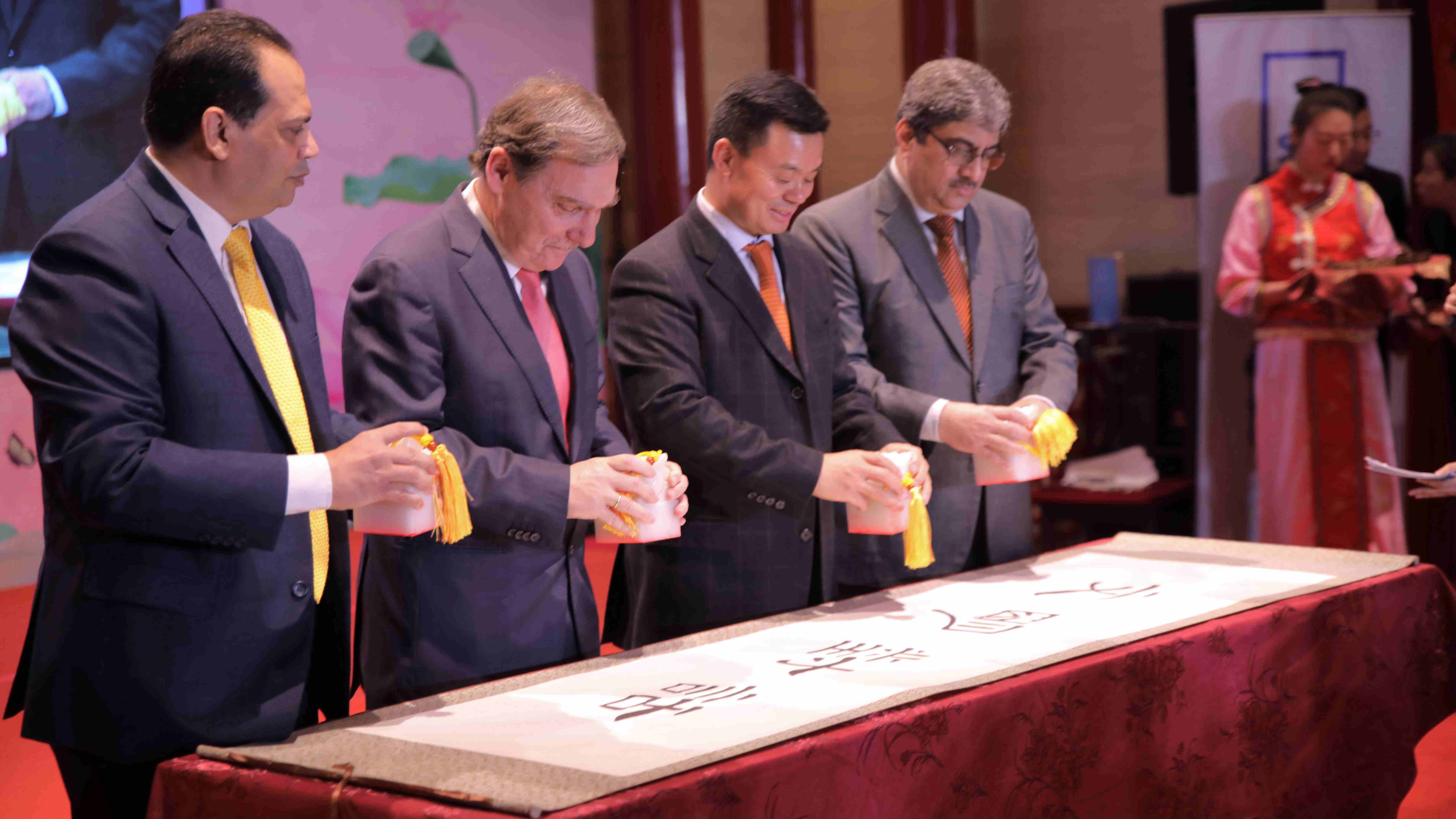
From left: Egypt's Cultural Counsellor Hussein Ibrahim, Greek Ambassador to China Leonidas Rokanas, Deputy Director of the News Center of CCTV and Controller of CGTN Jiang Heping, and Indian Ambassador to China Gautam Bambawale use special stamps in the shape of the traditional Chinese royal seal with the word "civilization" marked in four languages – Hindi, Greek, Ancient Chinese and Arabic – to officially launch CGTN's "Dialogue of Civilizations" in Beijing, China, November 15, 2018. /CGTN Photo
From left: Egypt's Cultural Counsellor Hussein Ibrahim, Greek Ambassador to China Leonidas Rokanas, Deputy Director of the News Center of CCTV and Controller of CGTN Jiang Heping, and Indian Ambassador to China Gautam Bambawale use special stamps in the shape of the traditional Chinese royal seal with the word "civilization" marked in four languages – Hindi, Greek, Ancient Chinese and Arabic – to officially launch CGTN's "Dialogue of Civilizations" in Beijing, China, November 15, 2018. /CGTN Photo
Rokanas will be seen representing Greece as an expert on CGTN's first edition of "Dialogue of Civilizations" prime time debate along with teams from China, India and Egypt, each comprising a TV host and an expert. CGTN has collaborated with Egypt's Nile TV, India's NDTV and Greece's Hellenic Broadcasting Corporation (or, ERT) for the show, scheduled to be broadcast simultaneously by all the participating channels on November 28, 2018.
The Greek envoy stressed that the world could benefit from the history of great civilizations.
"It's true for all civilizations, we can always learn and we should learn from our classical past," he said, adding: "This is what we have been doing in my country, this is what Europe has been doing. I think this is what the West is trying to do. And I think this is what China has done, at least in the last very miraculous years of Chinese development and Chinese rise."
"I think they were very wise to go back in their past and to define what is Chinese and what are those Chinese characteristics that we all talk about," he noted.
'Wisdom and sense of history'
00:57
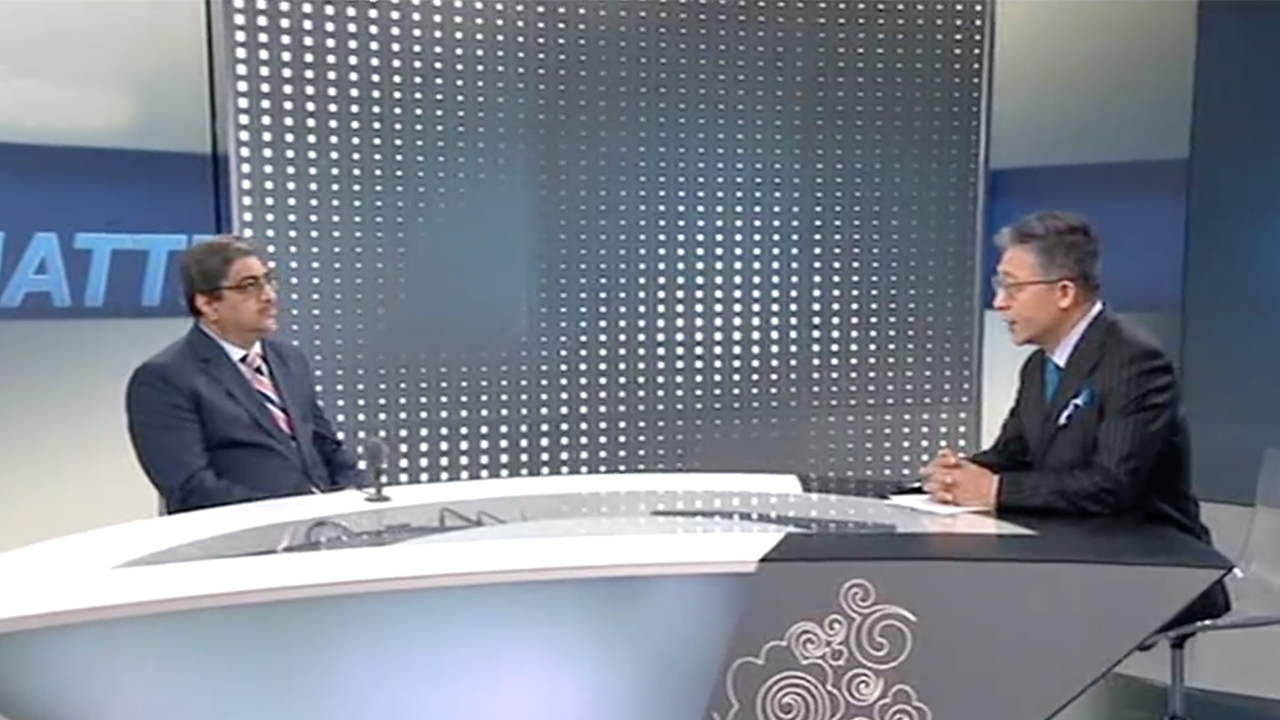
Invoking the ancient Indian philosophy of "vasudhaiva kutumbakam," which means the world is one family, Indian Ambassador to China Gautam Bambawale rejected the fears if a clash emphatically.
"In India, we are very optimistic that we will not get into a situation where we have a clash of civilizations but instead we will not only have a dialogue of civilizations but [also] all civilizations will move ahead together," he told CGTN's "Dialogue with Yang Rui."
Citing the many commonalities between China and India – two of the ancient civilizations that have survived to the present – the Indian envoy said: "The first is that we have a civilization which is thousands of years old – 4,000-5,000 years old. So, our sense of history is something which makes us separate from other countries in the world."
"We also have the wisdom amongst ourselves to see that we need to move forward to ensure that our relationship continues, that we can learn from each other, we can cooperate with each other and I think there is enough wisdom in both our countries for us to be able to do that, to overcome some of the problems that we have today and to make a stronger relationship between our two countries," he elaborated.
Emphasizing that people-to-people interaction go a long way in encouraging a positive dialogue at every level, the Indian ambassador revealed that both the Chinese and the Indian governments have recognized the need to boost such exchanges and established a mechanism led by the foreign ministers on both the sides.
"We need to have more people from China going to India, more people from India coming to China, more films going both ways, more tourists going both ways," he said.
'Languages bridge the cultural gap'
01:42
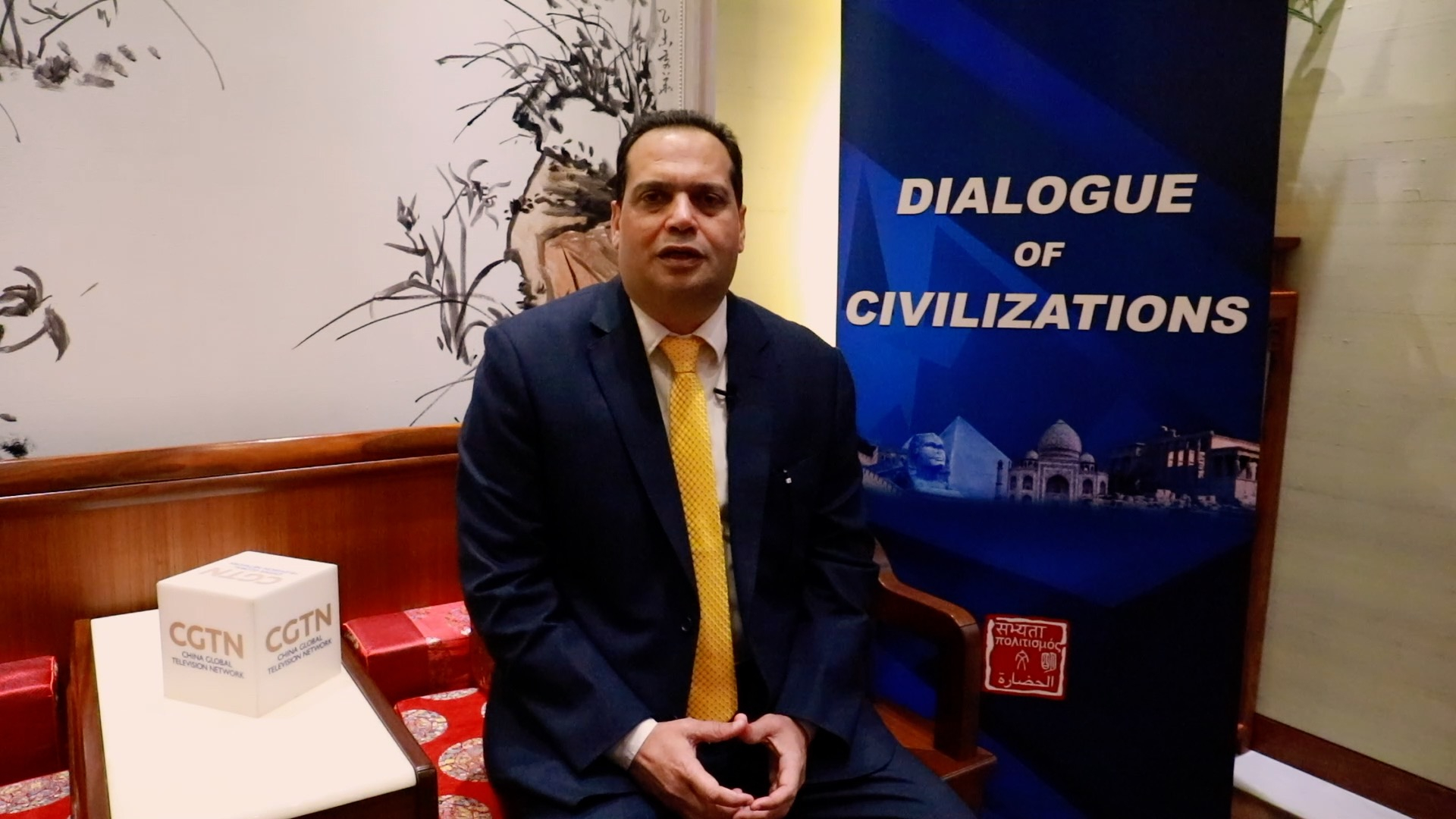
Concurring with the Indian diplomat on the positive outcome that people-to-people exchange could achieve in the context of the dialogue between civilizations, Egypt's Cultural Counsellor Hussein Ibrahim encouraged the youth to read more about different cultures and also learn foreign languages.
"Languages are the bridge to understand other cultures and societies," Ibrahim told CGTN Digital, himself speaking in fluent Mandarin. "Communication should not be limited to the level of governments and high-level officials. People-to-people exchanges are extremely important to understand each other and reduce the chances of misinterpretations that give rise to the fears of clash of civilizations," he added.
"A lot of people are speaking of the clash of civilizations, but if we review the past, we will see that even during the Egyptian and Graeco-Roman periods, many civilizations were cooperating," Ibrahim said, dismissing Huntington's prophecy.
Asserting that people of different cultures should live peacefully and harmoniously, the Egyptian official also cited an Arabic saying which could be roughly translated into: "When I reach out to you, I neither care either about the color of your skin nor your religion."
'Foundation of a diverse community'
01:25
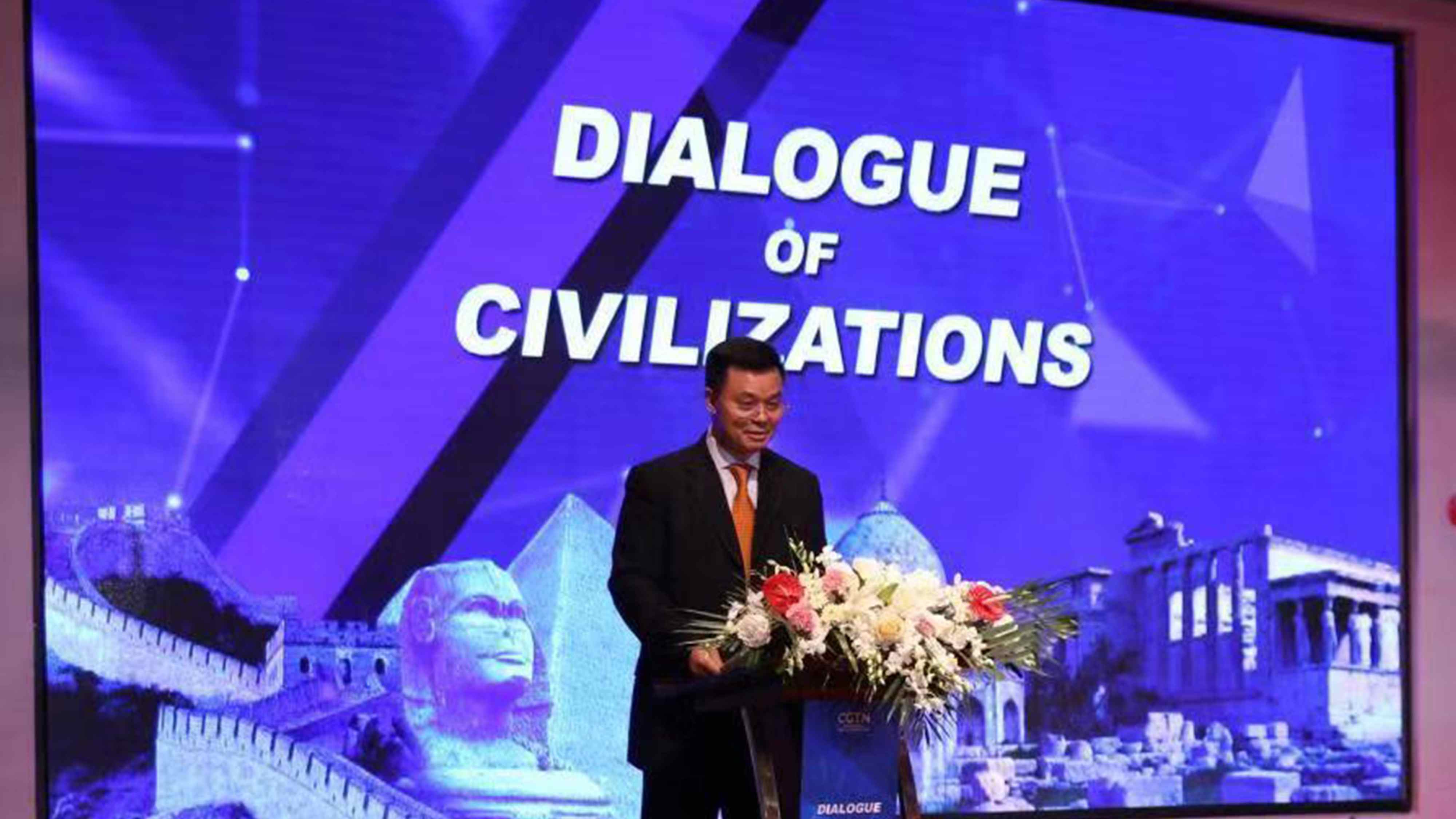
The overwhelming sentiment of engaging in dialogue and cooperation over clashes and conflicts by the dignitaries were aptly summarized by Jiang Heping, deputy director of the News Center of CCTV and controller of CGTN, at the inauguration of the first edition of "Dialogue of Civilizations" TV forum in Beijing on Thursday.
"Today's world has banished the clash of civilizations to usher in dialogue and communication. Both the past and the present have shown that the good communications among civilizations are usually the times when conflicts and wars are under effective control," he said.
"In Chinese civilization, the essential values of mutual appreciation and harmony stress kindness, love and good neighborliness. However, at the same time, we also recognize the importance of tolerance and inclusiveness," he added.
"As a country with a well-preserved and uninterrupted history, we feel it more deeply how the common development of many different civilizations form the foundation of a diverse community. All civilizations are equal and they should be equally respected and appreciated. While handing down our own civilizations, we should also safeguard and promote the diversity of fellow civilizations, which represent the common historical and cultural legacy of humanity," Jiang stressed.
(Nai Qian also contributed to the story.)
1km

SITEMAP
Copyright © 2018 CGTN. Beijing ICP prepared NO.16065310-3
Copyright © 2018 CGTN. Beijing ICP prepared NO.16065310-3